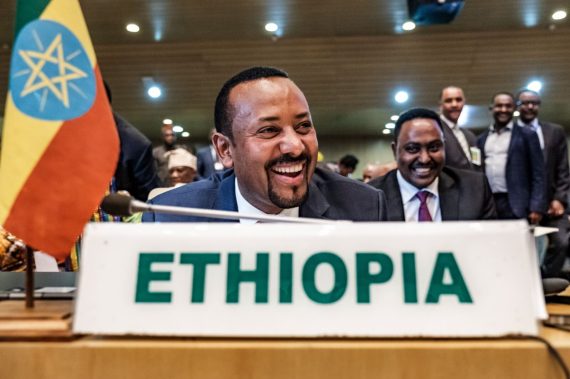On January 23, 2019, at the Davos World Economic Forum, Ethiopia’s reformist PM, Abiy Ahmed, remarked his vision for integrating the diplomatic and military establishments of Ethiopia, Eritrea, and Djibouti, for the benefit of the people in the region. Regional integration, which is PM Abiy’s third pillar of his reform agenda, in addition to democratization and economic liberalization, is breathing air for positive change in the Horn of Africa. This began with the land mark rapprochement with Eritrea in July 2018 and has extended to Somalia and Djibouti. On the other hand, Saudi Arabia and the UAE have played a significant role in the speedy rapprochement. The question that remains then is, is Abiy Ahmed’s Ethiopia bandwagoning with Gulf monarchies or charting its own hegemonic agenda?
At first glance, it seems as a bandwagon. According to Alex de Waal, with the blessing of the U.S., the Saudis and Emiratis promised Abiy financial backing if he pushed for peace with Eritrea. PM Ahmed, whose government is under critical foreign currency crisis, delivered promptly. When delivered, the UAE’s Crown Prince visited Addis Adaba and pledged 3 billion USD. Then, the highest awards of both monarchies, the Order of Abdulaziz Al Saud Medal and Order of Zayed Medal were conferred on Abiy and Eritrea’s President, Isayas Afewerki. What makes Abiy’s engagement with the Gulf powers look like bandwagoning is the signing of the agreement in Jeddah at the presence of the King and Crown Prince.
Otherwise, it should have been signed in Addis Ababa or Asmara in the presence of the leading African regional organizations, like the African Union and Intergovernmental Authority on Development (IGAD). In furthering its expansionist agenda and in a bid to attract Ethiopia into the Riyadh-Abu Dhabi axis, the UAE promised to build an oil pipeline connecting Eritrea’s port city of Assab to Addis Ababa. In line with the pledge of the UAE’s Crown Prince, a 2 billion USD mixed-use project was launched in Addis Ababa by the UAE’s firm, the Eagle Hills, which further signaled Ethiopia’s increasing ties to Abu Dhabi.
Is Abiy Ahmed’s Ethiopia bandwagoning with Gulf monarchies or charting its own hegemonic agenda?
The critically needed financial support and investment opportunities, as well as the presence of over half a million Ethiopian laborers in these countries force Ethiopia to orient well with them. Moreover, PM Abiy Ahmed is unarguably the friendliest and understanding of the leaders of Ethiopia towards the Arab world. As a son of a Muslim father, a student of conflict studies with a PhD in Peace and Security Studies, and a politician who brokered peace between parties to religious conflicts in his home town, Abiy Ahmed would naturally be expected to has overcome the “siege mentality” of Ethiopian leaders vis-a-vis Arab powers. Besides, the closer relations that Saudis and Emiratis have with the U.S. and the role that Donald Yamamato, the then Acting U.S. Assistant Secretary of African Affairs and current Ambassador to the Federal Republic of Somalia, has played in evolving relations between the states on both sides of the Red Sea, further strengthens the argument that Ethiopia has no option but bandwagoning with the monarchies in unfolding geopolitical power plays in the Horn of Africa.
However, a closer look at Ethiopia’s recent hegemonic behavior favors the argument that Addis Ababa balances against the presence of Gulf Monarchies in the Horn of Africa. For example, PM Abiy has been attempting to spearhead regional integration, security and common position in international relations through two tripartite summits with Somalian and Eritrean leaders. The Joint Declaration Agreement on Comprehensive Cooperation signed on 6 September at Asmara by the three leaders is meant to insulate the region from further penetration by external powers. The second trilateral summit which was held at Gonder, Ethiopia, on 9 November, called for respecting Somalia’s sovereignty, which is against the closer relations that Abu Dhabi has forged with unruly and autonomous regions of Somalia. Furthermore, PM Abiy also hosted another trilateral summit with leaders of Sudan and Djibouti in Jimma, Ethiopia. Further evidence for Ethiopia’s hegemonic move is the initiative to rebuild the Ethiopian navy that will be dispatched to protect interests of Ethiopia in the Red Sea. A statement by the Deputy Chief of Staff of the Ethiopian Defense Force, General Berhanu Julla, “We must show our influence around the sea. Different countries are coming from far and creating influences on the sea. We are a great nation with over 100 million people. There is no any reason Ethiopia remains landlocked,” confirms this.
Recommended
As a son of a Muslim father, a student of conflict studies with a PhD in Peace and Security Studies, and a politician who brokered peace between parties to religious conflicts in his home town, Abiy Ahmed would naturally be expected to has overcome the “siege mentality” of Ethiopian leaders vis-a-vis Arab powers.
This bold hegemonic move is premised on Ethiopia’s national role conception as a regional power that has never succumbed to foreign aggression and shines as a beacon of independence in Africa and beyond. In the Horn of Africa proper, which comprises Ethiopia, Somalia, Eritrea and Djibouti, Ethiopia commands a clear hegemonic power status with over 80% of the population and %58.5 of the land of the region, the strongest armed forces in Sub Saharan Africa and one of the fastest growing economies in the world. With a respected role as a security provider and a peace maker in the IGAD region and a member of the African Union and a non-permanent member of the UN Security Council, subservience of Ethiopia to the whims of the Gulf powers is very limited.
Another reason why Ethiopia’s relations with the Gulf powers cannot go beyond pragmatic partnerships in certain mutual matters is Egypt. Cairo, which is being backed by Riyadh and Abu Dhabi, has always worked to the detriment of Ethiopia to secure untouched Nile waters out of which about 86% is sourced from Ethiopia. For centuries, Egypt has tried to conquer Ethiopia, blocked financing of projects related to hydraulic works, sponsored and armed insurgent and separatist groups against Ethiopian state, including Eritrea’s secession from Ethiopia that made it landlocked and more vulnerable. Consequently, unless the multibillion dollar Grand Ethiopian Renaissance Dam construction will be completed, and subsequently imagined and real subversive hydro-hegemonic behaviors of Egypt will be subsided, activities of any Arab power around the Horn of Africa will be translated negatively by Ethiopia’s foreign and security establishment.
Ethiopia’s relations with the Gulf powers cannot go beyond pragmatic partnerships in certain mutual matters because of Egypt. Cairo, which is being backed by Riyadh and Abu Dhabi, has always worked to the detriment of Ethiopia to secure untouched Nile waters out of which about 86% is sourced from Ethiopia.
The sectarian agenda is also a factor that affects Ethiopia’s relations with the rich Gulf monarchies. Ethiopia has always been against any form of Islamist movement sponsored by foreign powers. Even genuine and peaceful protests of the Ethiopian Muslim community against government interventions into religious affairs have been met with brute force and crushed coercively. Even if the context is different, Abiy’s viral statement: “you cannot teach Islam to us,” quoting himself to have said to the UAE’s Crown Prince, speaks volume about the attitudes Ethiopian authorities have towards a sectarian agenda. Allowing the sectarian agenda of Middle Eastern powers into large but marginalized Muslim population of Ethiopia, probably larger than the entire population of Saudi Arabia and UAE combined, is political suicide for Ethiopia.
To cut a long story short, Addis Ababa welcomes foreign financial and technical supports, as well as investment and job opportunities for the sake of a large but poor population and in return for mutual prosperity and a more peaceful neighborhood. Nevertheless, Ethiopia is too proud and powerful to subscribe to whims of foreign powers in its own backyard at its own peril.





